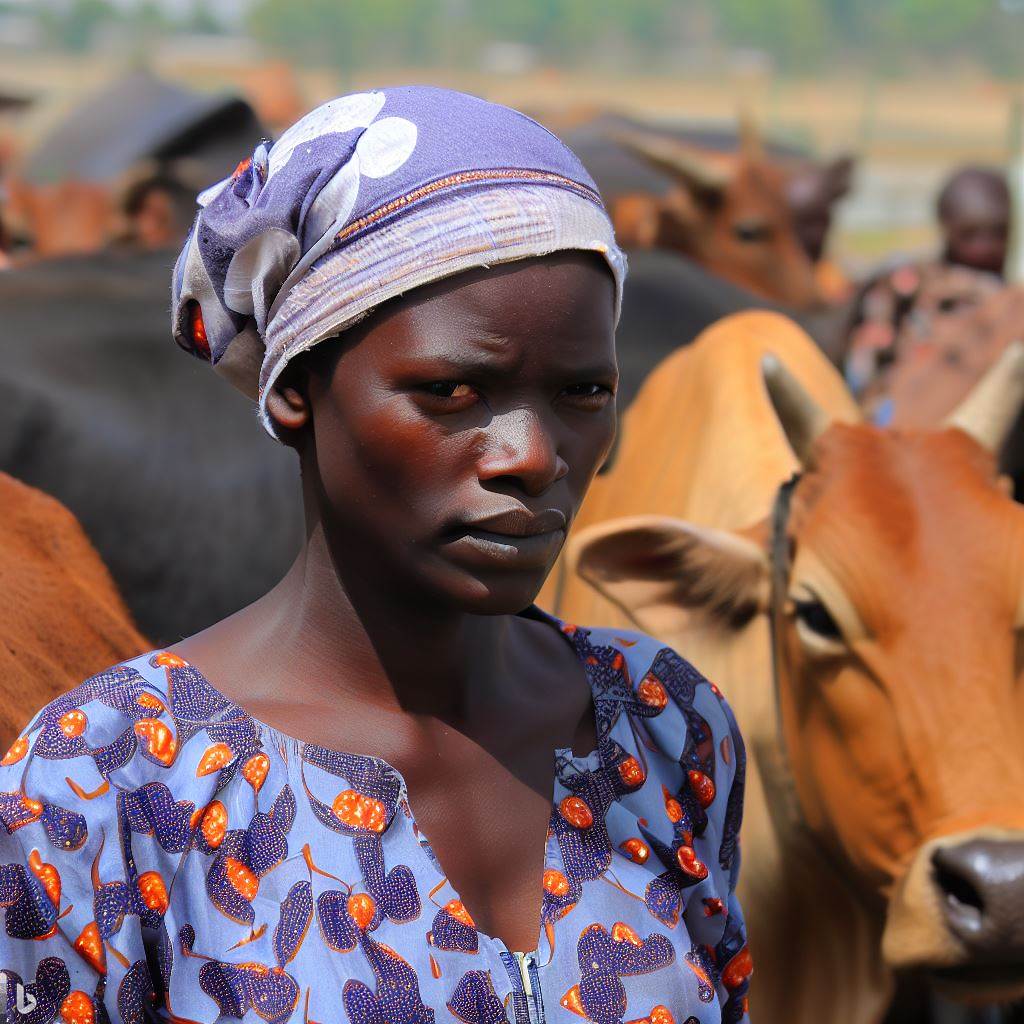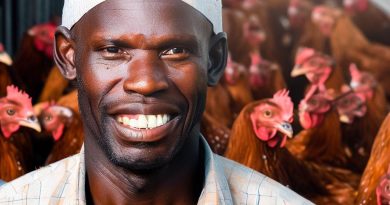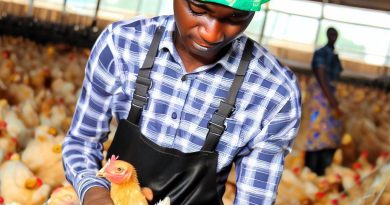The Rise of Livestock Production in Nigeria: A Detailed Analysis
Last Updated on August 14, 2023
Introduction
Livestock production in Nigeria is a crucial sector that contributes significantly to the country’s economy. With a population of over 200 million, Nigeria relies on livestock for food security, employment, and export revenue. This post aims to analyze the rise of livestock production in Nigeria and its implications.
Nigeria’s livestock industry has experienced significant growth in recent years, driven by an increasing demand for meat, dairy products, and other livestock-related products.
Livestock production plays a vital role in providing nutritious food to the Nigerian population, especially in rural areas where access to alternative protein sources is limited.
In addition to ensuring food security, the livestock sector also creates employment opportunities, particularly in rural communities.
It provides income for small-scale farmers, herders, butchers, and various other stakeholders along the value chain. This significantly contributes to poverty reduction and economic development in Nigeria.
In this post, we will delve into the main factors that have led to the rise of livestock production in Nigeria.
We will discuss the government’s role in promoting the sector, advancements in technology and breeding practices, as well as the challenges faced by livestock farmers.
Through this analysis, we aim to provide a comprehensive understanding of the current state of livestock production in Nigeria and its future prospects.
Stay tuned for upcoming sections where we will explore the government’s initiatives, technological advancements, and the impact of livestock diseases on the industry. Let’s dive in and unravel the intricacies of Nigeria’s thriving livestock production sector.
Historical overview of livestock production in Nigeria
The rise of livestock production in Nigeria is not a recent phenomenon. Livestock rearing has been a part of the country’s history for centuries, contributing significantly to its economy and food security.
Early history of livestock rearing in Nigeria
Livestock rearing in Nigeria dates back to ancient times. The early inhabitants of the region engaged in subsistence farming, which included the rearing of various domesticated animals such as cattle, sheep, goats, and poultry.
These animals were kept primarily for their meat, milk, eggs, and other by-products.
In the pre-colonial era, livestock played a crucial role in the socio-cultural fabric of Nigerian communities. They were not only a source of sustenance but also a symbol of wealth and status.
Livestock ownership was considered a sign of prosperity, and it formed an integral part of traditional ceremonies and rituals.
Traditional methods of livestock production
Traditional methods of livestock production in Nigeria were characterized by extensive practices. Herdsmen, known as Fulani or Hausa pastoralists, played a significant role in livestock management.
They practiced nomadic or transhumant pastoralism, moving their herds from one location to another in search of grazing lands and water sources.
The traditional herding system ensured the optimal utilization of natural resources. Livestock were allowed to graze freely, benefiting from the abundance of natural pasture.
Livestock owners’ knowledge and experience in animal husbandry were passed down from generation to generation, ensuring the sustainability of the industry.
Challenges faced by the industry in the past
Despite its long history, the livestock industry in Nigeria has faced numerous challenges that have hindered its growth and development.
Lack of modern infrastructure
In the past, the livestock industry suffered from inadequate infrastructure, including a lack of well-equipped veterinary clinics, slaughterhouses, and transportation facilities.
This made it difficult to provide optimal healthcare services to the animals, process meats safely, and transport livestock and animal products efficiently.
Poor breeding practices
Traditional livestock production methods often relied on natural breeding, resulting in limited genetic improvement.
This led to lower productivity and the prevalence of low-quality breeds, impacting the overall profitability and competitiveness of the industry.
Inadequate access to finance and credit
Livestock farmers often faced challenges in accessing affordable finance and credit facilities.
This restricted their ability to invest in modern farming technologies, purchase high-quality breeds, and improve the overall productivity of their herds.
Inadequate healthcare services
Limited access to quality healthcare services for livestock was a significant challenge. The lack of well-equipped veterinary clinics and trained professionals affected disease control and management, resulting in increased mortality rates and reduced profitability.
These challenges, among others, significantly impacted the productivity and profitability of the livestock industry in Nigeria.
However, in recent years, efforts have been made to address these challenges and promote the sustainable growth of the sector.
Essentially, understanding the historical overview of livestock production in Nigeria provides insight into the origins of the industry and the challenges it has faced.
It also highlights the importance of adopting modern practices and investing in infrastructure and research to ensure the continued growth and sustainability of livestock production in the country.
Read: Case Study: Successful Farm Managers in Nigeria
Factors contributing to the rise of livestock production in Nigeria
There are several factors that have contributed to the significant increase in livestock production in Nigeria in recent years:
- Economic growth and increased demand for animal protein
- Government policies and initiatives supporting the sector
- Technological advancements in animal husbandry
- Improved access to veterinary services and infrastructure
Economic growth and increased demand for animal protein
As Nigeria’s economy has grown, so has the demand for animal protein, including meat, milk, and eggs. This increased demand has led to a rise in livestock production to meet the growing needs of the population.
With a growing middle class and improving living standards, more Nigerians are able to afford animal protein as part of their diet.
This has created a lucrative market for livestock farmers and has incentivized them to expand their operations and increase production.
Government policies and initiatives supporting the sector
The Nigerian government has recognized the importance of the livestock sector in contributing to the country’s food security and economic development.
As a result, they have implemented several policies and initiatives to support and promote the growth of livestock production.
These policies include providing subsidies and grants to livestock farmers, improving access to credit and insurance schemes, and investing in research and development to enhance the productivity and efficiency of the sector.
The government has also encouraged public-private partnerships to attract investment and stimulate innovation in livestock production.
Technological advancements in animal husbandry
The advent of new technologies in animal husbandry has revolutionized the way livestock is bred, raised, and managed in Nigeria. This has significantly increased productivity and efficiency in the sector.
New breeding techniques, such as artificial insemination and embryo transfer, have allowed farmers to improve the genetic traits of their livestock, resulting in higher-quality animals with better growth rates and disease resistance.
Furthermore, the use of modern farming equipment and machinery has made it easier for farmers to handle large herds, reduce labor costs, and improve overall efficiency.
Technology has also played a crucial role in improving feed formulations, disease diagnosis, and disease management in livestock production.
Improved access to veterinary services and infrastructure
In recent years, there has been a significant improvement in access to veterinary services and infrastructure across Nigeria.
This has had a positive impact on livestock production by reducing disease outbreaks and improving overall animal health.
The government has invested in the construction and renovation of veterinary clinics, laboratories, and diagnostic centers, making it easier for farmers to access veterinary services and receive timely treatment for their livestock.
This has helped reduce mortality rates and increase the productivity of the sector.
Furthermore, the development of better transportation networks has made it easier for farmers to transport their livestock to markets and processing facilities, reducing post-harvest losses and ensuring a steady supply of animal protein to consumers.
Basically, the rise of livestock production in Nigeria can be attributed to a combination of economic growth, government support, technological advancements, and improved access to veterinary services and infrastructure.
These factors have created a conducive environment for the expansion and enhancement of the livestock sector, ensuring the availability of high-quality animal protein for the Nigerian population.
Read: Future Prospects of the Farm Manager Profession in Nigeria
Analysis of livestock species favored in Nigeria
In Nigeria, livestock production is diverse and includes several species that are commonly reared for various reasons.
The most commonly reared livestock species in Nigeria include cattle, goats, sheep, and poultry. These species have gained popularity due to specific factors that contribute to their overall production.
Cattle
Cattle are highly favored in Nigeria for several reasons. Firstly, they are a significant source of meat and milk, which are essential dietary components for many Nigerians.
Additionally, cattle are used in traditional ceremonies and cultural events, making them an integral part of Nigerian culture.
The contribution of cattle to the overall livestock production in Nigeria is substantial.
The meat from cattle, known as beef, is widely consumed and in high demand. Similarly, milk from cows is an important source of nutrition and is used to produce various dairy products.
Goats
Goats are another popular livestock species in Nigeria. They are relatively easy to rear and adapt well to the Nigerian climate and environmental conditions. Goats are reared for multiple purposes, including meat, milk, and skins.
The popularity of goats in Nigeria is also influenced by cultural practices and traditions. For instance, during religious holidays and ceremonies, such as Eid al-Adha, goats are widely slaughtered and distributed among communities.
In terms of overall production, goats contribute significantly to meat consumption in Nigeria.
Additionally, goat milk is consumed by some Nigerians and is used as a raw material for the production of cheese and other dairy products.
Sheep
Sheep are another favored livestock species in Nigeria. They are adaptable, resistant to diseases, and require less maintenance compared to some other livestock species. Sheep are primarily reared for meat and wool production.
The popularity of sheep in Nigeria can also be attributed to their cultural significance. During festive seasons and cultural celebrations, sheep are slaughtered and prepared as special dishes, enhancing their demand and value.
Sheep contribute significantly to the overall meat production in Nigeria. Additionally, wool from sheep is used in the textile industry for the production of clothing, blankets, and other woolen products.
Poultry
Poultry, including chickens and turkeys, is a vital livestock species in Nigeria.
The rearing of poultry is relatively inexpensive and requires less space, making it accessible to a larger segment of the population. Poultry is primarily kept for meat and egg production.
The popularity of poultry in Nigeria is driven by the high demand for chicken meat and eggs. Poultry products are widely consumed and form an essential part of the Nigerian diet.
Additionally, the poultry industry provides employment opportunities and contributes to the economy.
In terms of overall production, poultry, especially chickens, play a significant role in meeting the protein requirements of the Nigerian population. Eggs from poultry are also a crucial source of nutrition.
In a nutshell, the analysis of livestock species favored in Nigeria highlights the importance of cattle, goats, sheep, and poultry in the country’s livestock production.
These species are popular due to factors such as cultural significance, adaptability, ease of rearing, and high demand for their products.
Understanding the contribution of each species helps in recognizing their impact on food security, economy, and cultural traditions in Nigeria.
Read: Nigeria’s Farmer Support Systems: An In-depth Look

Impact of livestock production on the Nigerian economy
Livestock production in Nigeria has significantly contributed to the country’s economy in various ways.
Below, we discuss the economic benefits generated by the sector, analyze the role of livestock exports in foreign exchange earnings, and explore the employment opportunities created by the industry.
Economic Benefits Generated by the Livestock Sector
Increased Agricultural GDP
Livestock production has played a vital role in boosting the agricultural GDP of Nigeria. The sector contributes a significant share to the country’s overall agricultural output.
Export revenues
Livestock products like beef, poultry, dairy, and leather have become major exports. These exports generate substantial foreign exchange earnings for Nigeria, helping to stabilize the national economy.
Contribution to food security
The livestock sector provides a steady supply of animal protein such as meat, milk, and eggs, enhancing food security for the Nigerian population. This reduces reliance on expensive imports and supports local consumption.
Supporting agricultural value chains
Livestock production supports other sectors within the agricultural value chain, such as animal feed, veterinary services, transportation, and processing. This creates additional economic opportunities and income streams.
Rural livelihoods
The livestock sector plays a vital role in rural economies, providing income and opportunities for small-scale farmers and pastoralists. Livestock rearing gives rural communities a means of subsistence and improves their living standards.
Role of Livestock Exports in Foreign Exchange Earnings
Demand for Nigerian livestock products
Nigeria’s livestock exports, including meat, dairy, and leather, have witnessed a steady increase in demand from international markets. This contributes to foreign exchange earnings for the country.
Diversification of exports
The livestock sector allows Nigeria to diversify its export base beyond oil and gas, reducing its over-reliance on a single commodity. This strengthens the country’s economic resilience and reduces vulnerability to oil price fluctuations.
Trade partnerships
Livestock exports foster trade partnerships with other nations, creating opportunities for economic cooperation and investment.
This can lead to the establishment of joint ventures and technology transfers for the livestock industry, further boosting the economy.
Employment Opportunities Created by the Livestock Industry
Direct employment
Livestock production provides direct employment opportunities for a significant number of people, including farmers, herders, animal caretakers, veterinary professionals, and slaughterhouse workers.
Indirect employment
Alongside direct employment, the livestock sector also generates indirect employment opportunities in related industries such as feed production, animal health services, transportation, and marketing.
Youth engagement
Livestock production offers young Nigerians the chance to engage in entrepreneurial activities and develop innovative ideas within the sector.
This not only creates employment but also cultivates a culture of entrepreneurship and self-reliance.
Women empowerment
Livestock production involves the active participation of women in various roles, such as animal care, processing, and marketing. This empowers women economically and enhances their status within the society.
Generally, the impact of livestock production on the Nigerian economy cannot be overstated.
It generates economic benefits by increasing agricultural GDP, earning foreign exchange through exports, and creating employment opportunities.
The sector plays a crucial role in ensuring food security, supporting rural livelihoods, and diversifying Nigeria’s export base. Continued investment in the livestock industry is essential for the country’s economic growth and development.
Read: Farming Cooperatives in Nigeria: Job Opportunities
Challenges and Constraints Faced by Livestock Farmers in Nigeria
Livestock production in Nigeria faces numerous challenges and constraints that hinder its growth and development.
This section will address some of these issues, including disease outbreaks, inadequate veterinary care, the impact of climate change and environmental degradation, and the lack of infrastructure.
Disease Outbreaks and Inadequate Veterinary Care
Livestock farmers in Nigeria are often confronted with disease outbreaks that can cause significant economic losses.
Outbreaks such as Foot and Mouth Disease, Newcastle Disease, and African Swine Fever have a devastating impact on the livestock industry.
These diseases not only result in the death of animals but also lead to a decline in productivity and low-quality meat and dairy products.
One of the primary challenges faced by livestock farmers in Nigeria is the inadequate veterinary care available.
There is a lack of well-equipped veterinary clinics and skilled professionals to provide timely diagnosis, treatment, and prevention of diseases.
Insufficient access to vaccines and medicines further exacerbates the problem, leaving livestock farmers struggling to control and manage diseases effectively.
Impact of Climate Change and Environmental Degradation
Climate change and environmental degradation have a significant impact on livestock production in Nigeria.
Rising temperatures, erratic rainfall patterns, and prolonged droughts affect the availability and quality of pasturelands, water sources, and feed for livestock.
This leads to a decline in the overall health and reproductive capacity of animals.
Additionally, the degradation of natural resources through deforestation and overgrazing further worsens the situation.
Livestock farmers struggle to find suitable grazing lands and face increased competition for water resources.
The adverse effects of climate change and environmental degradation pose a severe threat to the sustainability and profitability of livestock production in Nigeria.
Lack of Infrastructure
Livestock farmers in Nigeria also face challenges related to the lack of infrastructure, which hampers their ability to effectively market and transport their products.
The absence of well-developed transport networks and storage facilities makes it difficult for farmers to access markets and ensure their produce reaches consumers in a timely manner.
This leads to post-harvest losses, decreased profitability, and limited market opportunities.
Furthermore, the lack of processing facilities and cold storage units prevents value addition and hampers the growth of the livestock industry in Nigeria.
Inadequate infrastructure not only affects the farmers’ income but also prevents the sector from achieving its full potential.
In the end, livestock farmers in Nigeria face several challenges and constraints that impede the growth of the industry.
Disease outbreaks and inadequate veterinary care, the impact of climate change and environmental degradation, and the lack of infrastructure are some of the key issues faced by farmers.
Addressing these challenges requires a comprehensive approach, involving investment in veterinary services, adaptation to climate change, and the development of robust infrastructure.
By overcoming these obstacles, Nigeria can unlock the full potential of its livestock sector and contribute to its agricultural and economic development.
Sustainable practices and future outlook for Nigerian livestock production
As the livestock industry in Nigeria continues to rise, it is crucial to explore strategies that promote sustainable practices. By adopting modern farming techniques and technologies, the potential benefits are immense.
Strategies to promote sustainable livestock production
To ensure the long-term viability of Nigerian livestock production, sustainable practices must be implemented. This includes proper waste management, water conservation, and land preservation.
One strategy is to educate farmers on implementing rotational grazing, which allows for the regeneration of pasturelands and reduces the risk of overgrazing.
Another approach is promoting the use of organic fertilizers to improve soil quality and minimize environmental contamination.
Potential benefits of adopting modern farming techniques and technologies
The livestock sector can greatly benefit from the adoption of modern farming techniques and technologies. For example, improved breeding and genetics can lead to higher productivity and better-quality animals.
Additionally, the use of precision farming technologies, such as sensors and drones, can optimize resource allocation and reduce the environmental impact.
These advancements can contribute to increased efficiency and profitability in the industry.
The role of education and training in improving productivity and efficiency
Education and training play a significant role in enhancing productivity and efficiency in Nigerian livestock production.
By providing farmers with knowledge and skills, they can make informed decisions and implement best practices.
Training programs can focus on animal nutrition, disease prevention, and proper handling techniques.
Farmers equipped with the right education are more likely to achieve higher yields, reduce losses, and ensure the health and welfare of their livestock.
Potential future developments and opportunities in the sector
The future outlook for Nigerian livestock production is promising, with several developments and opportunities on the horizon.
One area of growth is the export market, where Nigerian livestock products can find international demand.
Furthermore, the rising middle class in Nigeria presents an opportunity for increased consumption of meat and dairy products.
This demand can drive investments in the industry, leading to modernization and improved efficiency.
Technological advancements, such as artificial intelligence and blockchain, also hold potential for transforming the livestock sector.
These innovations can enhance traceability, improve supply chain management, and promote consumer trust.
In general, sustainable practices are essential for the future of Nigerian livestock production.
Through the adoption of modern farming techniques, education and training, and seizing potential opportunities, the sector can continue to thrive and contribute to the country’s economic growth.
Conclusion
The rise of livestock production in Nigeria has been a significant development for the country.
We have discussed the main points surrounding this topic, highlighting the increased demand for livestock products and the potential economic benefits it brings.
Livestock production not only provides a vital source of income for farmers but also contributes to food security and poverty reduction.
It is important to recognize the importance of supporting and investing in the livestock sector to ensure its sustainability and growth.
We must encourage policies and initiatives that promote modernization, research, and development in livestock production.
This will enable Nigeria to harness the full potential of its livestock resources and become a leading player in the agricultural sector.
Let us all join hands and work towards a vibrant and sustainable livestock industry in Nigeria.
Remember, the future depends on how we nurture and invest in our livestock sector.
Together, we can create a prosperous and resilient agricultural sector that benefits both farmers and the nation as a whole.


